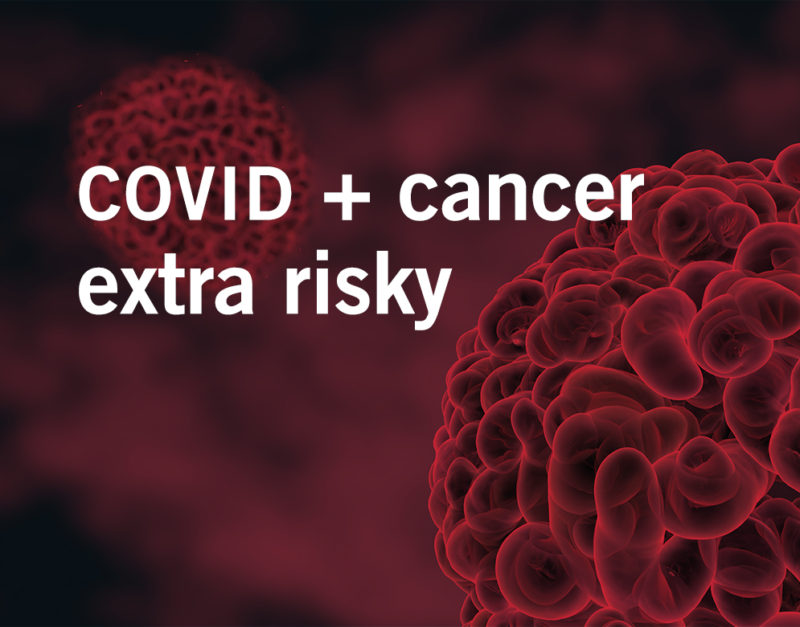 August 5, 2020
August 5, 2020 Nearly five months have passed since the World Health Organization declared the COVID-19 outbreak a pandemic. Much has changed since then, leaving all of us unsure as to what comes next. The only sure thing is the level of danger this virus poses to every population, especially high-risk groups who are medically compromised. Those with certain pre-existing conditions like blood cancers, such as leukemia, find themselves being treated in the shadow of COVID-19.
Patients with Cancer Appear More Vulnerable to COVID-19
Since the start of the global crisis, oncologists have been concerned about delays in cancer tests and screenings, which are crucial for monitoring and detecting disease. Researchers, on the other hand, mourn as clinical trials are put on hold and important studies are stalled. All this disruption is reflected in patients who worry that going in for life-saving treatment might just be the death of them. Critical new research has revealed that lung and blood cancer patients are three times as likely to die from COVID-19 if they are infected. According to the authors of the paper, this is because leukemia, and other cancers, actively attack the immune system, reducing the patients’ natural defenses, and leaving them open to dangerous infections.
Along with age, various subtypes of leukemia greatly influence the survival rate of a patient. When it comes to COVID-19, however, there seems to be a consistent decline in life expectancy for most blood cancer patients who contract the virus. To put things into perspective, in 2020, an estimated 60,530 new cases of leukemia will be diagnosed in the U.S., and 23,100 people will die from the blood cancer itself. Meanwhile, the number of leukemia patients who will overcome their disease only to be exposed to COVID-19, have a threefold higher death rate than the general population, which further puts them at a disadvantage. Though the chances of developing leukemia are increased in individuals with certain genetic abnormalities, those exposed to chemicals like benzene for lengthy periods of time are at particular risk of having abnormal growth of cells in their blood.
Adapting to the New Normal
Operational changes are underway as cancer clinics switch around treatments, postpone surgeries, and catch up with patients via video meetings. Having to carefully weigh which procedures can be delayed, and which are too essential to wait on is a decision that no oncologist wants to make, and no patient wants to undertake. Nonetheless, it is a call that should be discussed to ensure the health and safety of patients and medical staff. Healthcare institutions like Seattle Cancer Care Alliance (SCCA), have set in place several initiatives to reduce exposure to the virus, like screening every individual who enters the clinic for respiratory symptoms, and the use of surgical masks by all staff.
With all of that said, people should not let a seemingly small illness or pain spin out of control. Leukemia patients need to stay in touch with their doctor or cancer treatment team regularly. Those who experience a severe ailment should seek medical attention immediately.
Everyone Plays a Part in the Battle Against Covid-19
Healthcare providers and other essential workers are currently working harder than ever to protect and save lives. It is important for people to remember that everyone can help just as well by keeping a six-foot distance from one another. While humans are social creatures by nature, it is times like these when alternative measures are worth exploring for the safety of public health. Practicing hygiene by regularly washing hands and wearing masks are some of the few habits that slow down the spread of COVID-19.
The American Cancer Society suggests several steps to protect everyone from the coronavirus. Here are some quick tips for staying healthy and reducing your risk.
- Practice social distancing and stay at home.
- If going out in public, wear a mask that covers the nose and mouth.
- Wash hands frequently with soap and water and avoid shaking hands.
- Discuss the possibility of telemedicine or video meetings with doctors.
- If infusions usually occur at a medical facility, ask about alternatives or home treatments.
- As always, leukemia patients should talk to their physician first for the best plan of action and additional tips.
How We Help Benzene Victims
Seek justice with the help of our experienced attorneys. Our Dallas, Texas benzene law firm has battled corporate giants on behalf of individuals like you for 20 years, aggressively fighting to hold them responsible for dangerous chemicals and the personal injuries and cancers they cause. If you have been diagnosed with leukemia caused by dangerous products, we can help.


